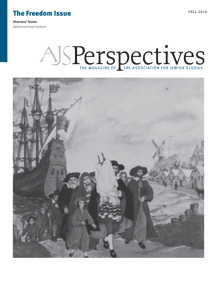Dear Colleagues,
"Once we were slaves, but now we are free." So asserts the Passover Haggadah in its narration of the foundational biblical story, the Exodus from Egyptian servitude. But as simple as that story can be in the retelling, the concept of freedom is almost impossibly complex. Within the biblical canon, the Israelites flee human enslavement for the yoke of Torah at Sinai; the rabbis, while celebrating freedom, were untroubled by the institution of slavery; and in more recent centuries and decades, Jews—often searching for their own freedom to live as Jews—have sometimes found themselves accommodating institutions and regimes hostile to liberty, including chattel slavery of African Americans, South African apartheid, or authoritarian forms of communism.
Freedom as a moral principle is easy to celebrate, and as a civic virtue, it is widely acclaimed. The practice of freedom, however, offers a far more complicated challenge. Freedoms come into conflict, and freedoms must in some fashion be limited and conflicts adjudicated. Certainly contemporary tensions concerning academic freedom and freedom of speech on college campuses illustrate the difficult reality of conflicting definitions and practices of freedom on a day-to-day basis.
In this issue of AJS Perspectives, we explore the concept of freedom from a range of perspectives and within a variety of frameworks. We have included reflections on experiences of freedom (and constraint), both in private life and in the classroom; these essays underscore how context—whether the USSR, rabbinical school, or seminary—can shape and delimit intellectual and experiential freedoms. A collection of essays on the American experiment offers a more historically grounded examination of a distinctly Jewish experience of freedom in "the land of the free." At the same time, institutions of freedom—and institutions that constrain liberty or compel individuals to curtail their own freedoms—are also explored.
Finally, we have embraced our own editorial freedom and replaced the Questionnaire section of Perspectives with a new occasional feature, a "Directors' Forum." In this forum, directors of Jewish Studies programs from a variety of institutions reflect on the idea, experience, and nature of freedom as they see it in their own contexts. In some cases, feelings run strong—and we have given the contributors free rein to express themselves.
Taken together, the essays and reflections in this issue highlight different definitions of freedom. There are freedoms "to" and freedoms "from"; individual liberties and civil liberties; histories of constraint and experiences of self-censorship. We hope you will make free and creative use of the ideas expressed here to continue this conversation— unconstrained.
Jonathan M. Hess
University of North Carolina at Chapel Hill
Laura S. Lieber
Duke University

